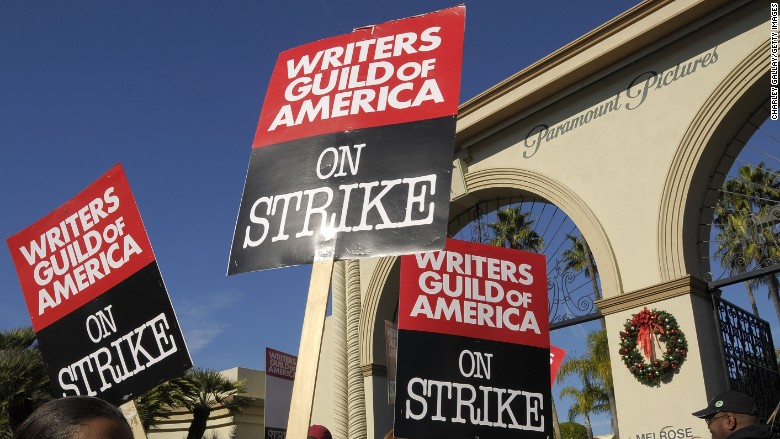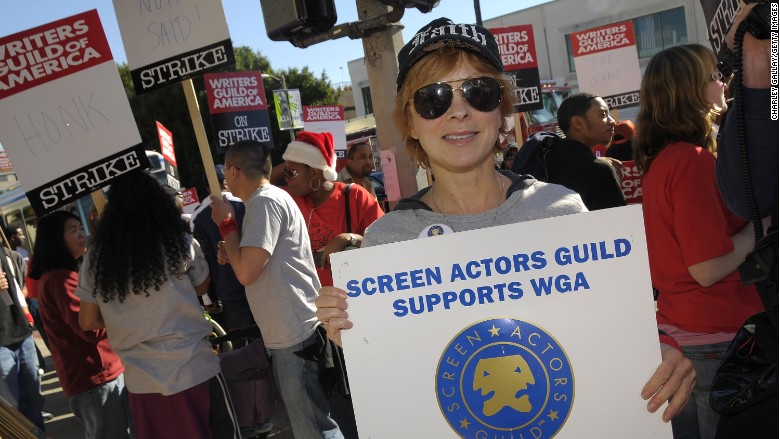
There's seemingly more opportunities than ever for writers in Hollywood, between movies, TV and new digital services. But if the Writers Guild of America is not able to agree to a new contract before May, it all could come to a screeching halt, nearly a decade since the union's last strike that lasted 100 days and carried a billion-dollar price tag.
At issue: The WGA's three-year-contract with the Alliance of Motion Picture and Television Producers (AMPTP) is about to expire. Among the Guild's requests are higher pay for TV writers and more funding toward healthcare.
As has historically been the case in these labor disputes, the catalyst can be traced to new technologies that have created uncertainty about the industry's business model.
The issues
The shifting entertainment landscape has complicated discerning the various sources from which studios are garnering revenue, and actually diminished compensation to some TV writers because more shows are ordering fewer episodes.
The 20,000-member WGA is asking for higher wage minimums to compensate for what they see as lost work.
According to the Hollywood Reporter, the episode-per-series tally dropped to an average of 13.2 in 2014-15, down from 18.8 three years earlier.
TV writers earned an average of $194,478 in 2015 and film writers earned an average of $181,267 that same year, according to an earnings report released by WGA last summer.
The main impediment facing writers in their quest to gain a higher percentage of revenues is that studios insist they're suffering in this era of Peak TV as well.
Effects of a strike
Members of WGA last went on strike in late 2007, when everything from movie productions to late night shows shuttered.
The issues then included DVD residuals and revenue from the still relatively nascent arena known as "new media."
The strike lasted 100 days (seeping into 2008), and took a billion dollar bite out of the California economy.
That is because the ripple effect of scripted production halting extends not only to actors and crews, but also the many businesses that rely on servicing the entertainment industry, magnifying the economic costs.
Consumers felt the effects of the strike, too.
Across television, a number of hits -- like "30 Rock," "Bones," and "ER" -- ended their seasons several episodes short of their typical runs. And other shows, like "Friday Night Lights," just brought their seasons to a best-they-could end before the strike and picked up with new storylines the following season.
Late night shows also went to reruns. David Letterman's production company, however, made a side deal with the WGA that allowed "Late Show with David Letterman" and "Late Late Show with Craig Ferguson" to return before the strike's end.
This time around, a strike could have an additional cost. With some fledgling cable networks already struggling to survive, a strike could see many get the ax.
Networks and studios could also choose to reevaluate their models.
"This gives them the opportunity to clear the deck and transform the way they do business as well, perhaps -- pick up fewer shows, fewer pilots, fewer series," said Michael Schneider, an executive editor at IndieWire and an editor-at-large at Variety who covered the strike back in 2007. "On the positive side, if they do get some of what they're asking for -- higher minimums or pension security or health care security -- that's a good thing. But it might come at the cost of fewer job opportunities."
The gamble for writers, as always, is whether the income they might be sacrificing in the short term will pay off down the road, especially because the studios, as multinational conglomerates, are better able to absorb the pain.
In the past, that has included a reliance on reality TV and overseas acquisitions, as well as movies that have been in the production pipeline well in advance.
What does this mean for the next season of...
To sell a film script, work on a pilot, or write a line of dialog for television, WGA membership is essentially mandatory. Every major production studio is a WGA signatory, which means they agree to hire only WGA writers.
Hollywood is still a union town. The Screen Actors Guild, the Producers Guild of America and the Directors Guild tend to support one another, so actors and directors aren't likely to cross picket lines to work.

Cast members from "Grey's Anatomy," "Entourage" and a number of other series joined their shows' writers on past picket lines.
A company like Netflix is well positioned to sustain during a strike. It not only has a library of acquired content, but it also has a healthy backlog of original TV shows and films waiting to be released.
Broadcast networks, on the other hand, do not and have a lot more to lose in terms of viewer loyalty, said Schneider, who is also host of KCRW's TV business podcast, The Spin-off.
"When you suddenly go dark for who knows how long, that just sends a message to consumers that linear TV is even less vital and you push away even more of the few people who are still watching traditional linear TV to streaming [and] to the world of on demand television," he said. "And you're not necessarily going to get those people back."
Both WGA West and WGA East have sought strike authorization from its members, giving the group more leverage in negotiations.
A spokesperson for AMPTP told CNN that the decision to break off recent negotiations was made by WGA.
"Keeping the industry working is in everyone's best interests, and we are ready to return to negotiations when they are," the spokesperson said.


